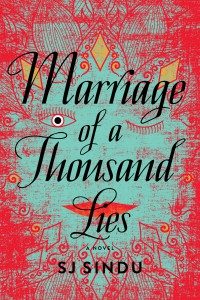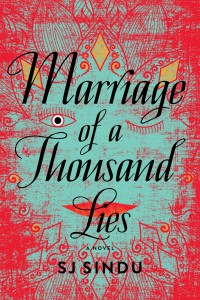Lucky is a lesbian, but in her conservative Sri Lankan family, that’s not an option. She married her gay friend Kris and they go to gay bars, have lovers, and still have the approval and conditional love of their family. When her grandmother falls and Lucky has to move back home to help take care of her, the lies become harder and more pressing. Then, Lucky’s childhood sweetheart Nisha is getting married, and Lucky wants to save her. She’s trapped in the obligations of a family that has many of its own problems–her father divorced her mother for her best friend, her sister entered an arranged marriage she didn’t want but seems happy, and her other sister ran away. Lucky wants to escape this life of duty without happiness, but how can she leave her family behind?
This was a hard story, I won’t lie. There is a lot of honesty and truth in this book, and the author doesn’t pull any punches. Lucky is miserable, and her obvious depression bleeds through the page. Having said that, it’s important to note that this is not a bad story–this is an amazing story that surrounds sad events.
Every single character is so unique and well-rounded that by the end of the book, I felt like I knew these people personally. Lucky’s mother clings to these traditions and cultural rules so desperately as a way to keep control of her life that has been destroyed by these same rules (her husband who left her is accepted in their society, but not she, the divorced woman). Her grandmother has always been very dear, and has lived an amazing life, but now puts Lucky into a panic with talk of grandchildren. Nisha wants her family to love and accept her, but she also wants to have her own life and happiness. Kris is desperate to be different from what he is, to keep up this lie as much as possible, to never let go, no matter the cost to Lucky.
A lot of these characters come across as unlikeable for good reason. Lucky’s mother is unquestioningly homophobic. At times it seems that Nisha is using Lucky more than caring about how her decisions have an affect on her. Kris, similarly, seems to be using Lucky.
Kris in particular I had a hard time giving as much empathy to as I was with the other characters. As much as I hated Lucky’s mother’s decisions, I can understand them. I felt all of her Lucky’s pain every time Nisha did something to hurt her, but I can also sympathize with where Nisha is coming from. But with Kris, at times it really felt like he just saw Lucky as a means to an end, the end being his acceptance in their community and his family. Lucky wants to lie to keep her family happy, but Kris seems to want more than that. He wants to be normal and have the social status he would have if he was straight.
Social status and community acceptance are themes for all the characters. The author does a great job of explaining the Sri Lankan culture and traditions, creating an immersive experience that also helps to inform the reader of the characters’ motivations. As much as I didn’t like what a lot of them did, I understood them and stayed engaged with their story arcs.
The writing itself is also amazingly beautiful. The exact and specific imagery that flows through the narrative pulled me so effectively the real world felt like a blur. I think I must have highlight lines on every page, it was so stunning.
This is a great book, and I do highly recommend it. It’s not a light and fluffy read, so don’t go into it expecting that, but it is fulfilling.



